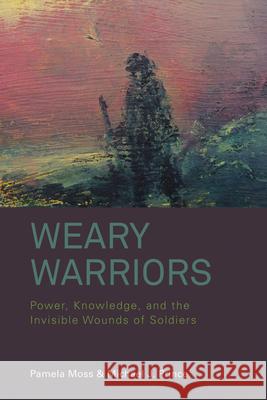Weary Warriors: Power, Knowledge, and the Invisible Wounds of Soldiers » książka
Weary Warriors: Power, Knowledge, and the Invisible Wounds of Soldiers
ISBN-13: 9781782383468 / Angielski / Twarda / 2014 / 286 str.
As seen in military documents, medical journals, novels, films, television shows, and memoirs, soldiers' invisible wounds are not innate cracks in individual psyches that break under the stress of war. Instead, the generation of weary warriors is caught up in wider social and political networks and institutions-families, activist groups, government bureaucracies, welfare state programs-mediated through a military hierarchy, psychiatry rooted in mind-body sciences, and various cultural constructs of masculinity. This book offers a history of military psychiatry from the American Civil War to the latest Afghanistan conflict. The authors trace the effects of power and knowledge in relation to the emotional and psychological trauma that shapes soldiers' bodies, minds, and souls, developing an extensive account of the emergence, diagnosis, and treatment of soldiers' invisible wounds. Pamela Moss is a Professor in Human and Social Development at the University of Victoria, British Columbia, Canada. She co-authored with Isabel Dyck of Women, Body, Illness (Rowman and Littlefield, 2003), edited with Katherine Teghtsoonian Contesting Illness (University of Toronto Press, 2008), and wrote and edited with Karen Falconer Al-Hindi Feminisms in Geography (Rowman and Littlefield, 2008). She is working on a book manuscript about women's tired bodies entitled Fatigue.
As seen in military documents, medical journals, novels, films, television shows, and memoirs, soldiers invisible wounds are not innate cracks in individual psyches that break under the stress of war. Instead, the generation of weary warriors is caught up in wider social and political networks and institutions-families, activist groups, government bureaucracies, welfare state programs-mediated through a military hierarchy, psychiatry rooted in mind-body sciences, and various cultural constructs of masculinity. This book offers a history of military psychiatry from the American Civil War to the latest Afghanistan conflict. The authors trace the effects of power and knowledge in relation to the emotional and psychological trauma that shapes soldiers bodies, minds, and souls, developing an extensive account of the emergence, diagnosis, and treatment of soldiers invisible wounds.Pamela Moss is a Professor in Human and Social Development at the University of Victoria, British Columbia, Canada. She co-authored with Isabel Dyck of Women, Body, Illness (Rowman and Littlefield, 2003), edited with Katherine Teghtsoonian Contesting Illness (University of Toronto Press, 2008), and wrote and edited with Karen Falconer Al-Hindi Feminisms in Geography (Rowman and Littlefield, 2008). She is working on a book manuscript about womens tired bodies entitled Fatigue.











